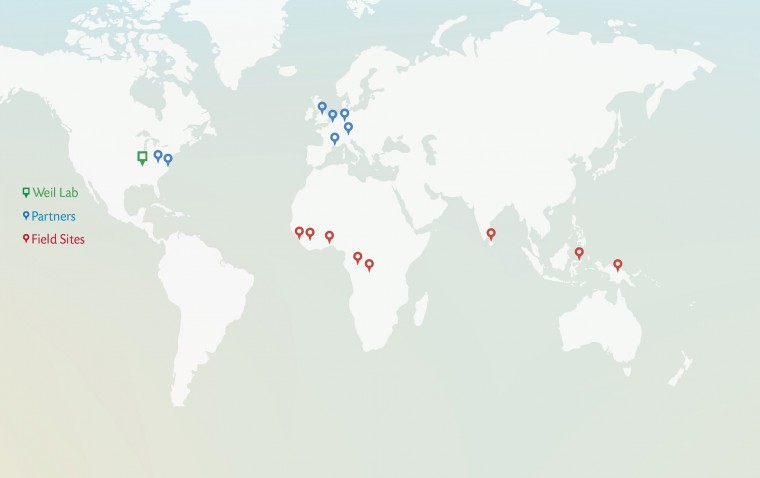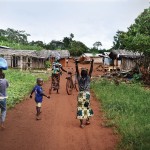Gary Weil, MD, leads a large global network of researchers and organizations in the Death to Onchocerciasis and Lymphatic Filariasis (DOLF) Project, which is funded by the Bill & Melinda Gates Foundation. In Africa and Asia, researchers conduct population-based epidemiology studies and clinical trials. The group also develops and evaluates diagnostic tests for lymphatic filariasis (LF), onchocerciasis (oncho) and intestinal worm infections, which are major public health problems in the developing world.
At Washington University, Weil’s lab consists of 12 members, including Peter Fischer, PhD, associate professor of medicine, who calls the abundant resources available at the university a veritable “Disneyland for researchers.” Case in point: Weil’s lab collaborates with researchers from The Elizabeth H. and James S. McDonnell III Genome Institute’s Helminth Sequencing Project, which is led by Makedonka Mitreva, PhD. Mitreva’s group is conducting both basic genomic research and working on projects with practical goals, such as the development of improved diagnostic tests, vaccines and new drugs for parasitic diseases.
Merck & Co.*, Johnson & Johnson and GlaxoSmithKline donate the drugs for the mass drug administration programs, and the U.S. Agency for International Development and Britain’s Department for International Development support the funding to distribute them. Ministries of health and NGOs help with in-country planning and organization. And the Gates Foundation funds operational research to study the effects of these mass treatments and to find ways to improve the regimens. The foundation hopes this research will generate new knowledge that can be used to shorten the time required to eliminate LF and oncho.
[*“Thirty years ago, half the adults who lived near rivers in African countries, where oncho occurred, were blind,” Weil says. “After Dr. Roy Vagelos, a former chair of biochemistry, left Washington University to become CEO of Merck, he made the decision in the late ’80s to support a massive donation program for Merck’s anti-parasitic drug Ivermectin. His decision was revolutionary; nobody had done anything on this scale before. Despite dissension within the industry, Merck built a special factory to manufacture the donated medicine and established an NGO to distribute it. Today, the program provides more than 100 million treatments per year. So Dr. Vagelos represents another university connection in the long-term fight against these diseases.”]
Partners
- Case Western Reserve University, Cleveland, Ohio, United States
- Centre for Neglected Tropical Diseases, Liverpool School of Tropical Medicine, United Kingdom
- Erasmus Medical Center, Rotterdam, Netherlands
- George Washington University Medical Center, Washington, D.C., United States
- Institut de Recherche pour le Développement, Montpellier, France
- Institute of Medical Microbiology, Immunology and Parasitology, Bonn, Germany
- Swiss Tropical and Public Health Institute, Basel, Switzerland
- Washington University, St. Louis, Missouri, United States
- (in addition to ministries of health, research centers and universities in host countries)
Field Sites
- Democratic Republic of the Congo
- Ghana
- Indonesia
- Ivory Coast
- Liberia
- Papua New Guinea
- Republic of the Congo
- Sri Lanka

